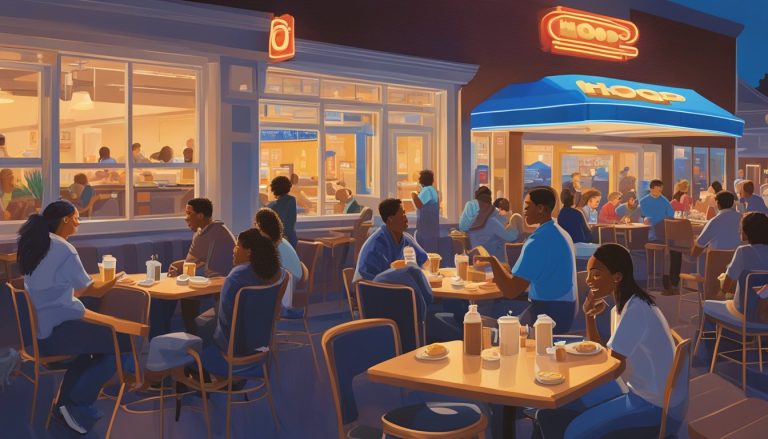IHOP’s comprehensive training program transforms employees into breakfast experts, equipping them with the skills to deliver exceptional service and mouthwatering pancakes. The six-week program covers essential restaurant operation skills, brand standards, and food safety certification, ensuring every IHOP team member is prepared to create memorable dining experiences.
New hires dive into hands-on training, mastering the art of crafting IHOP’s iconic pancakes and other breakfast favorites. The program also emphasizes customer service techniques, teaching staff how to create a welcoming atmosphere that keeps guests coming back for more.
By investing in thorough employee education, IHOP maintains consistency across its thousands of locations worldwide. This commitment to quality training has helped IHOP become a beloved breakfast destination, known for its friendly service and delicious menu offerings.
IHOP at a Glance

IHOP, short for International House of Pancakes, has become synonymous with American breakfast culture. The restaurant chain’s iconic blue roof and world-famous pancakes have made it a beloved destination for families and breakfast enthusiasts across the nation.
Brand Legacy
IHOP first opened its doors in 1958 in Toluca Lake, Los Angeles. Founded by Al and Jerry Lapin, the restaurant quickly gained popularity for its delicious pancakes and welcoming atmosphere. Over the decades, IHOP expanded rapidly, becoming a fixture in communities across America.
Today, IHOP boasts over 1,700 locations in all 50 states and several countries worldwide. The chain’s menu has evolved beyond pancakes to include a wide variety of breakfast, lunch, and dinner options, catering to diverse tastes and preferences.
The American Breakfast Icon
IHOP’s signature buttermilk pancakes remain the heart of its menu, drawing millions of customers each year. The restaurant’s family-friendly environment and affordable prices have solidified its place as an American breakfast institution.
IHOP’s iconic blue roof has become a symbol of comfort and consistency for diners. The chain’s commitment to quality ingredients and generous portions has earned it a loyal following. IHOP continues to innovate, introducing seasonal specials and adapting to changing consumer preferences while maintaining its classic charm.
The Franchise Model
IHOP’s franchise model offers entrepreneurs the opportunity to own and operate successful restaurants with comprehensive support. The company provides extensive training, marketing assistance, and operational guidance to help franchisees thrive in the competitive breakfast market.
Franchise Opportunities
IHOP welcomes qualified individuals to join its franchise network. Prospective franchisees must meet specific financial requirements, including liquid assets of $500,000 to $1 million. The initial term of an IHOP franchise agreement typically spans 20 years, subject to lease terms and location type.
Franchisees can choose between single-unit and multi-unit development agreements. Multi-unit management allows experienced operators to expand their portfolio within designated territories.
The Franchise Support Network
IHOP offers a robust support system to ensure franchisee success. This includes:
- Comprehensive training programs
- Site selection assistance
- Marketing and promotional support
- Operational guidance
Franchisees benefit from IHOP’s established brand recognition and menu offerings. The company provides ongoing support to help restaurants maintain consistency and quality across locations.
IHOP’s franchise support team assists with local marketing initiatives and national advertising campaigns. Franchisees pay a royalty fee, which contributes to the brand’s continued growth and development of support services.
IHOP Academy: The Training Ground

IHOP Academy serves as the cornerstone of IHOP’s training program, equipping new franchisees and staff with essential skills. It combines online learning with hands-on experience to create proficient restaurant operators.
Training Objectives
IHOP Academy aims to develop competent restaurant managers and staff. The program focuses on:
• Mastering IHOP’s menu and recipes
• Understanding brand standards and operating procedures
• Developing customer service skills
• Learning food safety and sanitation practices
Trainees must pass rigorous tests, including practical assessments, to demonstrate their knowledge and skill level. This ensures all IHOP locations maintain consistent quality and service.
Program Structure
The IHOP Academy training program is divided into two main phases:
- Restaurant Training
- Management Training
Restaurant Training covers:
- Food preparation techniques
- Kitchen equipment operation
- Order taking and POS system use
- Customer interaction skills
Management Training includes:
- Inventory management
- Staff scheduling and supervision
- Financial reporting
- Leadership skills development
Trainees progress through online modules and on-the-job training. They must pass both written and practical tests to advance and graduate from the program.
Refresher Courses and Ongoing Learning
IHOP recognizes the importance of continuous learning. The company offers:
• Regular refresher courses to keep staff updated on menu changes and new procedures
• Food safety certification renewal programs
• Advanced training for experienced managers
These ongoing learning opportunities help maintain high standards across all IHOP locations. They also provide career advancement paths for dedicated employees.
IHOP’s e-learning platform, accessible 24/7, allows staff to review materials and take additional courses at their convenience. This flexible approach ensures all team members can stay current with IHOP’s evolving practices and standards.
Establishing a New Franchise

Opening an IHOP franchise involves careful planning and execution. The process requires selecting an ideal location, building a capable team, and learning to operate the restaurant effectively.
Site Selection Process
IHOP provides franchisees with site selection assistance to ensure optimal placement. The company analyzes local demographics, traffic patterns, and competition to identify promising locations. Factors considered include population density, income levels, and proximity to complementary businesses.
Franchisees work closely with IHOP’s real estate team to evaluate potential sites. This collaboration helps secure locations with high visibility, easy access, and ample parking. The goal is to position the restaurant where it can attract a steady flow of customers throughout the day.
Once a site is chosen, IHOP assists with lease negotiations and construction planning. This support helps franchisees navigate complex real estate processes and local regulations.
Building the Team
Recruiting and training staff is crucial for a successful IHOP franchise. Franchisees typically hire a mix of experienced restaurant workers and newcomers to the industry. Key positions include managers, cooks, servers, and hosts.
IHOP provides guidance on staffing requirements and job descriptions. Franchisees learn effective interviewing techniques and employee selection criteria. The focus is on building a team that can deliver friendly, efficient service.
Training programs cover IHOP’s menu, service standards, and operational procedures. New hires learn about food safety, customer service, and the IHOP brand. Ongoing training ensures staff stay updated on new menu items and company policies.
Operating a Franchise Restaurant
Running an IHOP franchise requires balancing day-to-day operations with long-term business goals. Franchisees learn to manage inventory, maintain equipment, and ensure food quality. They also oversee financial aspects like budgeting and cost control.
IHOP’s operating procedures cover everything from food preparation to customer service protocols. Franchisees receive manuals and digital resources detailing these standards. Regular inspections help maintain consistency across the IHOP brand.
Marketing support is another key aspect of franchise operations. IHOP provides national advertising campaigns and local marketing tools. Franchisees learn to leverage these resources to drive customer traffic and build brand loyalty in their area.
Maintaining IHOP Standards

IHOP places a strong emphasis on upholding brand standards and delivering consistent quality across all locations. The company focuses on menu innovation while ensuring uniform service practices.
Menu Innovation
IHOP regularly updates its menu to offer fresh and exciting options. The brand introduces new pancake flavors, omelets, and breakfast items seasonally. Recent additions include savory crepes and protein-packed bowls. IHOP also expands beyond breakfast, enhancing its lunch and dinner selections.
While innovating, IHOP maintains its core identity as a breakfast destination. Classic pancake recipes and popular breakfast combos remain menu staples. The company balances tradition with modern tastes to appeal to a wide customer base.
Quality and Service
IHOP enforces strict standard operating practices to maintain food quality and service levels. All staff undergo comprehensive training on food preparation techniques, plating standards, and customer interaction guidelines. Managers conduct regular quality checks on ingredients and finished dishes.
Service standards emphasize prompt seating, attentive waitstaff, and efficient order fulfillment. IHOP sets target times for greeting guests, taking orders, and delivering meals. The company also implements mystery shopper programs to evaluate adherence to these standards.
Food safety is a top priority. IHOP mandates proper food handling procedures, equipment sanitation, and personal hygiene practices. Regular inspections and certifications ensure compliance with health regulations across all restaurants.
Marketing and Brand Presence

IHOP employs targeted local marketing strategies and leverages its iconic brand to drive customer engagement and sales growth. The company’s marketing efforts focus on promoting its signature breakfast offerings while expanding awareness of its full-day menu options.
Local Marketing Strategies
IHOP franchisees typically contribute to an advertising fee used to fund national and regional marketing campaigns. These campaigns often highlight seasonal promotions and new menu items through television commercials, social media ads, and digital marketing. Franchisees also engage in local marketing activities tailored to their specific markets. This may include sponsoring community events, partnering with local schools or organizations, and offering targeted promotions to drive traffic during slower dayparts.
IHOP utilizes data analytics to inform its marketing decisions, tracking customer preferences and dining patterns to optimize promotional strategies. The company also employs marketing consulting firms to refine its approach and stay competitive in the casual dining sector.
Leveraging IHOP’s Brand
As part of Dine Brands, IHOP benefits from the resources and expertise of a larger restaurant group. The company capitalizes on its strong brand recognition, particularly for breakfast, to attract customers throughout the day. IHOP’s marketing emphasizes its diverse menu options beyond breakfast, showcasing lunch and dinner offerings to expand its appeal.
The brand regularly introduces limited-time promotions and menu innovations to generate buzz and drive repeat visits. IHOP’s loyalty program rewards frequent customers and provides valuable data for targeted marketing efforts. The company also maintains an active social media presence, engaging with customers and responding to feedback to strengthen brand loyalty.
Financial Insights

The IHOP training program has significant financial implications for both franchisees and the company. Costs, profitability, and growth potential are key factors in evaluating the program’s financial impact.
Understanding Costs
Initial franchise fees for IHOP range from $40,000 to $50,000. Franchisees must also meet financial requirements, including liquid assets of at least $500,000 and a net worth of $1.5 million. The training program itself is included in these costs.
Equipment, inventory, and construction expenses can add up to $1-2 million for a new IHOP location. Ongoing costs include a royalty fee of 4.5% of gross sales and a marketing fee of about 3%.
Labor costs for trainees and trainers are significant. Franchisees must budget for wages during the six-week initial training period and subsequent ongoing training.
Profitability and Growth
IHOP’s training program aims to boost profitability through improved operations and customer service. Well-trained staff can increase efficiency, reduce waste, and enhance customer satisfaction.
The average IHOP location generates annual sales of $1.5-2 million. Profit margins vary but typically range from 8-12% after expenses and fees.
IHOP’s market share in the family dining segment is around 30%, indicating strong growth potential. The brand’s focus on breakfast leadership and expanding into other dayparts supports future revenue growth.
Franchisees benefit from IHOP’s brand recognition and marketing efforts. The IHOP rewards program, with 8 million members, drives a 6.5% sales mix, contributing to overall profitability.
Unique Business Propositions
IHOP’s training program equips franchisees with strategies to capitalize on diverse market opportunities and evolving dining trends. The company’s approach combines traditional and innovative elements to maintain its position in the competitive restaurant industry.
Non-Traditional Franchise Opportunities
IHOP offers flexible franchise models to adapt to various locations and customer needs. These include smaller-format restaurants in airports, colleges, and travel plazas. The training program covers operations tailored to these non-traditional spaces.
Franchisees learn to optimize kitchen efficiency and customer service in compact settings. IHOP’s curriculum includes modules on streamlined menus and quick-serve techniques for high-traffic areas.
The company also trains franchisees on managing kiosks and grab-and-go options. These alternatives cater to time-pressed consumers while maintaining IHOP’s signature breakfast offerings.
Family Dining Trends
IHOP’s training emphasizes creating a welcoming atmosphere for families. Franchisees learn to design kid-friendly spaces and implement family-oriented promotions.
The program covers menu development strategies that appeal to both adults and children. Trainees study nutritional guidelines and learn to offer balanced meal options.
IHOP instructs franchisees on maintaining a casual environment that encourages repeat family visits. This includes training staff to engage with children and handle large group dynamics.
The curriculum also addresses evolving family dining habits, such as increased demand for takeout and delivery services. Franchisees learn to integrate these options while preserving the dine-in experience.
Franchisee Success Stories
IHOP restaurants have seen numerous franchisees thrive in the competitive breakfast market. These success stories exemplify the potential of the IHOP franchise model.
One standout example is a franchise owner who started with a single location and expanded to five thriving restaurants within a decade. Their success stemmed from meticulously following IHOP’s proven systems and embracing menu innovations.
Another franchisee found success by focusing on exceptional customer service. By implementing IHOP’s training programs, they cultivated a team of breakfast experts who consistently delivered high-quality dining experiences.
A third success story involves a franchise candidate who navigated the approval process smoothly. Their thorough business plan and alignment with IHOP’s values fast-tracked their journey from candidate to successful owner.
These stories highlight key factors in IHOP franchise success:
- Adherence to proven systems
- Embrace of menu innovations
- Focus on customer service
- Effective implementation of training programs
- Strong business planning
- Alignment with brand values
IHOP’s comprehensive support system plays a crucial role in these success stories. From initial training to ongoing operational guidance, franchisees receive the tools needed to build thriving breakfast destinations.
Joining the IHOP Family

Becoming part of the IHOP franchise network involves a structured process and clear path to ownership. Prospective franchisees go through careful evaluation and onboarding to ensure they’re ready to uphold IHOP’s standards.
The Approval and Onboarding Process
Franchise candidates undergo a thorough approval process. IHOP evaluates applicants based on financial qualifications, business experience, and alignment with brand values.
Successful candidates sign a franchise agreement outlining terms and expectations. This legal document covers operational standards, fees, and territory rights.
New franchisees then enter IHOP Academy, the company’s comprehensive training program. It includes online courses and hands-on practice in restaurant operations, management, and IHOP’s signature menu items.
Trainees must pass practical tests and demonstrate proficiency in all aspects of running an IHOP location before final approval to open their restaurant.
The Path to Ownership
Once approved, new franchisees work closely with IHOP’s development team. This collaboration covers site selection, restaurant design, and construction oversight.
IHOP provides support in areas like marketing, supply chain management, and technology implementation. Franchisees gain access to IHOP’s sophisticated marketing programs to promote their restaurants.
New owners receive ongoing operational guidance and performance evaluations. This ensures consistency across the IHOP brand while allowing franchisees to grow their business.
Successful franchisees may pursue multi-unit ownership opportunities, expanding their IHOP portfolio within designated territories.




